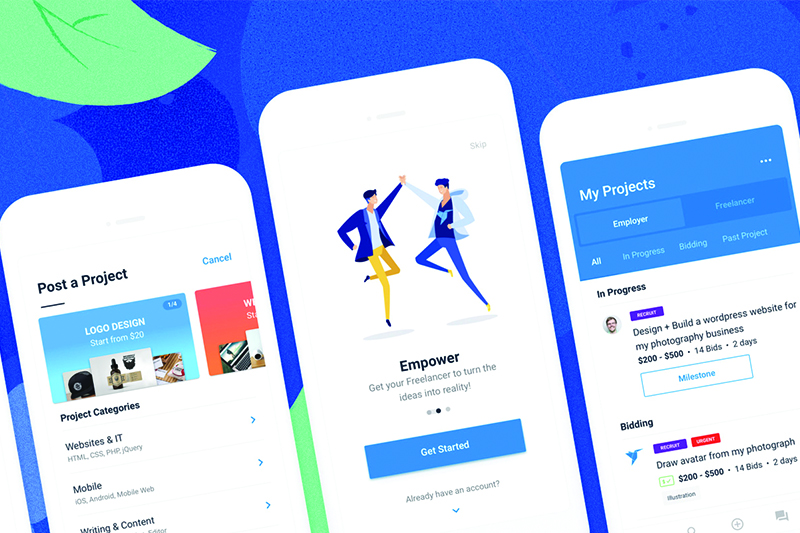Meet CEO Matt Barrie, the Australian tech entrepreneur whose latest company Freelancer.com has facilitated over 14 million jobs to date across 240 regions. Read his top tips for first-time founders.
Australian tech executive Matt Barrie operates in global recruitment markets across America, Europe, Asia and Australia with his award-winning employment marketplace Freelancer.com, valued at up to AUD 250 million according to the Sydney Morning Herald. Featured by the New York Times, Bloomberg, the Wall Street Journal, and the Economist, Matt was named one of Australia’s top 100 most influential engineers by Engineers Australia in 2015. With two hugely successful enterprises under his belt (his first was security tech company Sensory Networks, later sold to Intel) and ample experience from his background as a venture capitalist, he comes equipped with a wealth of hard-earned knowledge garnered through trial and error. During a quick trip to Hong Kong a couple months ago, he took the time to sit down with Hive Life to talk through the nuances of founding your own company, from which pitfalls to avoid to what shortcuts to take – all of which he’s learned the hard way.

Taking a seat at the interview table, Matt Barrie tells the entrepreneurial story of how he took Freelancer from being a small website to a big concern that IPO’d at AUD 1.1 billion in late 2013. “I bootstrapped it from 2009. I didn’t raise any money apart from the money I used to buy it,” Matt explains. “After I acquired it, I just went about fixing up all the problems I saw with it, and the revenue went up.” Taking home the title of the SPI Global Technology Company of the Year at the 2017 Asia CEO Awards, Freelancer is now 30 million users strong and growing, tapping into global markets across 240 regions.
Having been a founder two times over, Matt is well aware of the difficulties involved. “Get the product out early, talk to customers, create more products, and, if you can bootstrap it, it’s phenomenal because you can retain control,” he advises. Speaking to first-time founders, he acknowledges how tempting it can be to secure funding at any cost. “Be very careful with your first fundraising crowd,” he warns. “If you give too much up in terms of equity, it can become problematic down the line and it will be very hard to renegotiate.” Matt speaks from personal experience, having encountered the same issue with his first security company Sensory Networks, which was eventually acquired by tech giant Intel. “I did the traditional way of series A, series B, series C,” he explains. “But at each stage, you’re being boiled alive like a bullfrog – when you get to the end, you realise you only own 5% of this company.”
Offering an alternative, Matt recommends that early-stage startups strive to achieve “Ramen Profitability” as soon as they can – a stage just past the break-even point where the company can just about survive on noodles, having covered their operating costs and basic living expenses. “Once you’re at that breaking profitability level, you’re fine as you’re not desperate for money anymore,” he explains. “But if you’re still burning money, investors will know that, and they’ll wait until you’re really desperate.” Matt also advises firms to select their investors carefully when securing venture capital funding. “You’re going to want people who are entrepreneurs, who have a lot of experience, because things aren’t always going to be smooth sailing.”
Aside from seeking out investors, Matt flags up a third, often neglected, option of finding more creative ways to finance the company. “With my first contract at my last company, we had to manufacture hardware, but we didn’t have the products. We just had a concept,” he recalls. “So, I went up to the first customer and said, this product, this specification at this price, at this date – would you buy it? And I signed a contract off the back of that.” It’s an example of just another way to finance your company up front without raising money.

For now, Matt has turned his attention to the freelance industry – a niche which is expected to explode in the next decade. His company, Freelancer, is situated at the heart of this burgeoning field with Forbes forecasting that over 50% of American workers will be working freelance by 2027 if current trends continue. Situated somewhere between eBay and PayPal, the business operates on a competitive tender system, allowing adept freelancers to bid on projects employers have posted, charging a commission of 3% to the employer and 10% to the freelancer when both parties have finalised their terms. Payments are made through Escrow.com, a secure online transactions platform that has processed USD 4.9 billion to date.
Matt’s go-getter attitude spills over into his management style. Ever eager to streamline Freelancer further, he is determined to simplify the management process. “We have to keep improving and making a great experience, to keep creating what customers tell us so it makes it easier and easier for people to work together.” Having released group chats, a fast sharing-transit drive and project sharing tools, he believes the market needs better tools for collaboration, making it easier to share files, share work and function cohesively as a unit.
An entrepreneur through and through, Matt is determined to make his mark on the world. “We have a metric on our dashboard which is actually the number of lives changed per day, and we measure a changed life by someone who’s earning money for the very first time from our website,” he relates. “We’re providing jobs, opportunity and income around the world.” The company has facilitated over 14 million jobs to date, enabling individuals to explore options in different fields across over a thousand categories and opening up employment possibilities for people on the fringes of the employment sphere such as retirees, people with disabilities or those living in remote areas.
Leading the way for a workforce more accessible than ever before, Matt is steaming ahead with his company through milestone after milestone with no intention of slowing down. With technological breakthroughs leading the restructuring of labour markets, he sees a revolution is coming. And he’s determined to be at the heart of it.
x
Related Articles
5 Entrepreneur Tips to Learn from Successful Women





